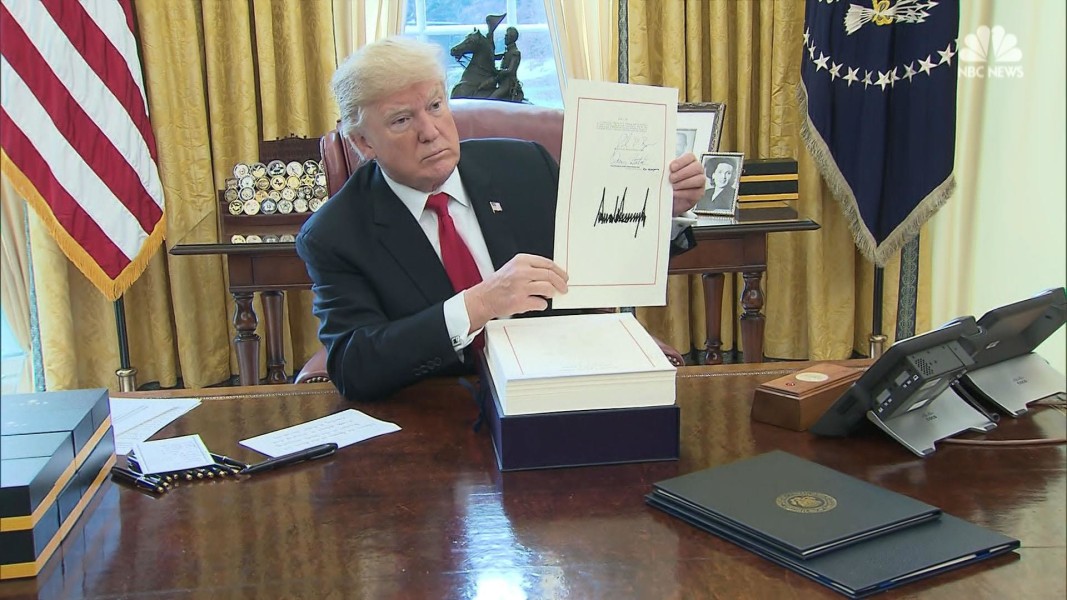Analysis: Trump's Tax Bill Faces Significant Republican Opposition

Table of Contents
Fiscal Conservatism vs. Tax Cuts
This section explores the conflict between fiscal conservatives within the Republican party and the expansive tax cuts proposed in the Trump tax bill. A central point of contention is the bill's potential impact on the national debt and the long-term economic health of the nation.
-
Concerns about increasing the national debt: Many fiscal conservatives express deep concern over the projected increase in the national debt resulting from the significant tax cuts. They argue that the bill prioritizes short-term gains over long-term fiscal responsibility, potentially jeopardizing future economic stability. Models projecting a substantial rise in the deficit are frequently cited in their arguments.
-
Debate over the long-term economic sustainability: The debate centers on whether the proposed tax cuts will stimulate economic growth enough to offset the revenue loss. Opponents argue that the “trickle-down” economic theory, which underpins the bill, lacks empirical support and may not lead to the promised job creation and economic expansion. They propose alternative approaches focused on targeted investments in infrastructure and human capital.
-
Differing opinions on the benefits of trickle-down economics: A key disagreement lies in the effectiveness of trickle-down economics. While proponents argue that tax cuts for corporations and the wealthy will incentivize investment and create jobs, opponents contend that this approach primarily benefits the wealthy, exacerbating income inequality without significantly boosting overall economic growth.
-
Analysis of alternative fiscal policies proposed by conservative Republicans: Some conservative Republicans have proposed alternative fiscal policies that prioritize deficit reduction and targeted spending cuts. These alternatives often involve a more measured approach to tax cuts, focusing on specific areas deemed to have the greatest economic impact.
Targeted Tax Breaks and Opposition
This section analyzes specific provisions within Trump's Tax Bill facing significant opposition. The political implications of these provisions are considerable, impacting various segments of the population and influencing the broader political landscape.
-
Opposition to specific tax breaks for corporations: Several provisions offering significant tax breaks to corporations have drawn intense criticism. Opponents argue that these breaks disproportionately benefit large corporations at the expense of smaller businesses and individuals. The lack of transparency surrounding some of these corporate tax benefits further fuels the opposition.
-
Concerns regarding the elimination or reduction of certain deductions: The proposed elimination or reduction of certain deductions, such as those for state and local taxes (SALT), has sparked outrage in many states. This has led to a bipartisan coalition of opposition, uniting lawmakers from both parties who represent affected areas.
-
Analysis of the impact of these provisions on different income brackets: A crucial aspect of the opposition centers around the perceived unequal distribution of benefits. Critics argue that the tax cuts predominantly benefit high-income earners and corporations, while offering minimal relief to lower and middle-income families. Detailed analyses of the bill's impact on various income brackets are used to support these claims.
-
Quotes from Republican lawmakers expressing their concerns: Numerous Republican lawmakers have publicly expressed reservations about specific provisions. Their statements highlight the internal divisions within the party and the significant challenges facing the bill's passage. These quotes add crucial context and credibility to the analysis of opposition. Public statements and media appearances are extensively analyzed to fully capture this critical perspective.
Intra-Party Power Struggles and Lobbying Efforts
This section examines the role of internal power dynamics and lobbying efforts in shaping the opposition to Trump's Tax Bill. The interplay of political maneuvering and interest group influence is crucial in understanding the current stalemate.
-
Influence of moderate Republican senators and their concerns: Moderate Republican senators, often representing more diverse constituencies, have played a critical role in voicing concerns about the bill's potential consequences. Their influence within the Senate is a significant factor in the opposition's strength.
-
Impact of lobbying by various interest groups: Various interest groups, including those representing taxpayers, businesses, and specific industries, have engaged in extensive lobbying efforts to influence the bill's outcome. Analysis of lobbying disclosure records reveals the intensity of these efforts and their potential impact on the legislative process.
-
Analysis of the strategies employed by opponents of the bill: Opponents of the bill have employed diverse strategies, including public advocacy campaigns, lobbying efforts, and collaborations with media outlets to raise public awareness and put pressure on lawmakers.
-
Examination of the potential for compromise and amendments: The possibility of compromise and amendments remains a key factor in the bill's future. The analysis explores potential areas of compromise and the willingness of opposing factions to negotiate.
Potential Consequences of the Opposition
This section analyzes the potential consequences of significant Republican opposition to Trump's Tax Bill. The outcomes could significantly impact the political landscape and the nation's economy.
-
Possible amendments to the bill: Given the level of opposition, significant amendments are likely before the bill could gain passage. These amendments could substantially alter the bill's original scope and impact.
-
The likelihood of the bill passing in its current form: The strong opposition raises serious doubts about the bill's chances of passing in its current form. The analysis evaluates the probability of passage considering the current political climate and the strength of opposition within the Republican party.
-
Impact on the Republican party's image and future elections: The internal divisions revealed by this opposition could significantly impact the Republican party's image and its prospects in future elections. The analysis considers the potential long-term consequences for the party's standing.
-
Alternative legislative agendas that might emerge: If Trump's Tax Bill fails, alternative legislative agendas addressing tax reform or other economic priorities might emerge. The analysis explores potential alternative approaches and their feasibility.
Conclusion
The analysis of the significant Republican opposition to Trump's Tax Bill reveals deep fractures within the party, stemming from differing ideological positions, concerns over fiscal responsibility, and strategic political considerations. The future of the bill remains uncertain, with potential amendments and the possibility of failure hanging in the balance. This situation highlights the importance of continued observation and analysis of Trump's Tax Bill and its evolving political trajectory. Stay informed and continue to follow our coverage for updates on the ongoing developments surrounding Trump’s Tax Bill and its potential impact. Understanding the nuances of this complex situation requires close monitoring of all aspects of the debate surrounding Trump's tax plan.

Featured Posts
-
 Will Anthony Edwards Play Key Injury Update For Timberwolves Lakers Matchup
Apr 29, 2025
Will Anthony Edwards Play Key Injury Update For Timberwolves Lakers Matchup
Apr 29, 2025 -
 Extreme Price Hike For V Mware At And Ts Concerns Over Broadcoms Proposal
Apr 29, 2025
Extreme Price Hike For V Mware At And Ts Concerns Over Broadcoms Proposal
Apr 29, 2025 -
 Kl Ma Thtaj Merfth En Fn Abwzby Ybda 19 Nwfmbr
Apr 29, 2025
Kl Ma Thtaj Merfth En Fn Abwzby Ybda 19 Nwfmbr
Apr 29, 2025 -
 Palisades Fire A Comprehensive List Of Celebrities Who Lost Their Homes
Apr 29, 2025
Palisades Fire A Comprehensive List Of Celebrities Who Lost Their Homes
Apr 29, 2025 -
 Fn Abwzby Tfasyl Alhdth Almntzr Fy 19 Nwfmbr
Apr 29, 2025
Fn Abwzby Tfasyl Alhdth Almntzr Fy 19 Nwfmbr
Apr 29, 2025
Latest Posts
-
 Oh What A Beautiful World A Review Of Willie Nelsons New Album
Apr 29, 2025
Oh What A Beautiful World A Review Of Willie Nelsons New Album
Apr 29, 2025 -
 Country Legend Willie Nelson Releases Oh What A Beautiful World
Apr 29, 2025
Country Legend Willie Nelson Releases Oh What A Beautiful World
Apr 29, 2025 -
 New Music Willie Nelson Releases 77th Solo Album At 91
Apr 29, 2025
New Music Willie Nelson Releases 77th Solo Album At 91
Apr 29, 2025 -
 New Music Willie Nelsons Oh What A Beautiful World
Apr 29, 2025
New Music Willie Nelsons Oh What A Beautiful World
Apr 29, 2025 -
 Oh What A Beautiful World Willie Nelsons Latest Album Details
Apr 29, 2025
Oh What A Beautiful World Willie Nelsons Latest Album Details
Apr 29, 2025
